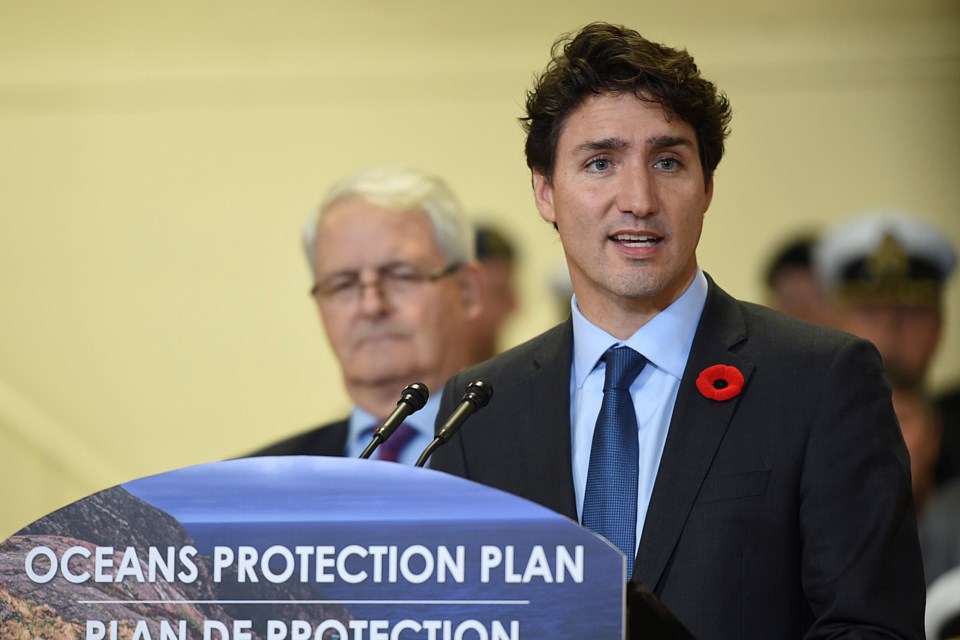Prime Minister Justin Trudeau was in Vancouver today to announce a $1.5 billion plan to protect Canadian coasts from oil and fuel spills – a plan that is short on spending details and which does not include a moratorium on oil tankers along the North Coast.
At a press conference held November 7 in Stanley Park at the HMCS Discovery Royal Canadian Navy reserve division, Trudeau announced an Oceans Protection Plan that he said will give Canada “one of the best marine safety and emergency preparation systems in the world.”
“Today’s announcement represents the most significant investment ever made to protect our oceans and coastlines,” he said.
“Our Oceans Protection Plan will result in a truly world-class system for marine protection and emergency preparedness – one that will meet or surpass the world leading safety practices of Alaska and Norway.”
Whether it will meet the B.C.’s government’s definition of a “world-class” marine protection and response plan remains to be seen, however. The federal plan announced today is short on the kind of details that B.C.’s own demands laid out as part of its five conditions for approving new oil pipelines.
Responding to the announcement, B.C. Premier Christy Clark said the there aren't enough details to judge whether it meet's B.C.'s demands for a world-class oil spill response plan, although she characterized the plan as a good start to fill some of the existing gaps in B.C. marine protection safety net.
She said she was “really very gratified that the federal government is responding” to its concerns about the lack of emergency response capacity to deal with marine accidents.
She also suggested that the bulk of the $1.5 billion in new funding announced Monday appeared to be coming B.C.’s way.
“This is a guess, but it looks like British Columbia is going to be receiving the bulk of the benefits from this,” she said.
But the plan only addresses B.C.’s current needs, Clark said. Whether it will also meet B.C.’s conditions for pipeline approval remains to be seen.
“This looks like a proposal that will meet needs that we have today,” she said. “It’s no secret to British Columbians that we don’t have the Coast Guard response that we need right now.”
Even if the federal government approved the Trans Mountain pipeline project, Clark said the province needs to do its own environmental assessment, as per a BC Supreme Court decision.
“So there is still a lot of work to do, should Kinder Morgan be approved," she said.
In making the announcement, Trudeau took pains to avoid any link between Ottawa's new plan and the pending decision on Kinder Morgan Canada’s Trans Mountain pipeline twinning project. A decision on that project is expected by mid-December.
When asked about the link between the new plan and oil pipelines, like the Trans Mountain project, Trudeau suggested the new plan should be put into place, regardless of whether new pipelines are approved, and pointed to the recent diesel fuel spill in Bella Bella as one recent example.
“The ongoing incident at Bella Bella is unacceptable,” he said.
“This is actually an announcement that is long overdue,” Trudeau said.” This is years overdue.”
The new plan includes:
• boosting the Canadian Coast Guard’s presence on the coast and increasing towing capacity for coast guard vessels;
• better monitoring of marine traffic;
• the creation of a new fund to finance coastal habitat restoration; and
• partnerships with First Nations to co-manage coastal protection programs.
Trudeau added the government will also introduce new legislation that will “get tough on businesses and industries that pollute along our coast.”
While the Trans Mountain pipeline twinning project has been front and centre lately, prior to last federal election, it was the Northern Gateway pipeline project that drew the most heat.
In the lead-up to the election, Trudeau promised a moratorium on tanker traffic on the North Coast. That would effectively kill the project, since it terminates in Kitimat and would therefore put tanker traffic along a coast that Trudeau promised will be tanker-free.
Asked about the moratorium, Trudeau said skirted the question.
Despite Trudeau’s visit being kept something of a secret, about two dozen anti-pipeline protestors were on hand to protest the announcement. Holding signs and chanting "Protect our oceans, stop Kinder Morgan," the protest is reported to have spooked horses pulling a carriage of tourists, some of whom were either bumped out or jumped out when the horses bolted.
Josha MacNab, B.C. director for the Pembina Institute, said increased protection of B.C. coasts to close some of the existing gaps in coastal protection is welcome.
“Whether or not it’s enough to justify actually increasing tanker traffic is another thing entirely,” she said.
She added she had expected to hear the prime minister say something about the promised moratorium on tanker traffic.
“We were certainly expecting that to be part of the announcement today, and so (we) hope that that’s forthcoming," she said. "That was definitely a commitment that was made and hasn’t been fulfilled yet.”
For business news go to biv.com



